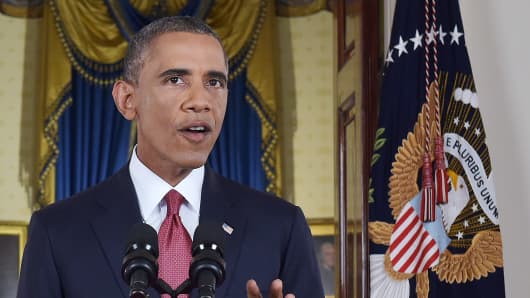President Obama deserves high praise for intervening in Kobani, launching airstrikes and providing weapons to the city's heroic Kurdish defenders. Obama acted in a nick of time, narrowly averting disaster. The U.S. should get ahead of events, shaping diplomatic and security solutions, especially when its ally,Turkey, is involved.
The United States intervened to prevent Islamic State fighters from taking Erbil, Sinjar, and Kobani. Its intervention was better late than never.
Read MoreForce alone won't beat ISIS: Ruler of Dubai
Islamic State fighters took Makhmour, just 18 miles from Erbil, and were marching on Iraqi Kurdistan's capital. Kurds were crying our for help, but Obama conditioned intervention on Iraqis forming an inclusive government. Its quid pro quo was overtaken by ISIS advances. Bombing by U.S. war planes prevented Erbil from being overrun.
U.S. officials initially downplayed the slaughter of Yazidis in Sinjar. Washington began dropping emergency supplies and attacking ISIS positions only after reports that 50,000 Yazidis were stranded on Mount Sinjar with no food and water.
The People's Protection Units, Syrian Kurdish fighters, were joined by the PKK in a heroic defense of Kobani. Pundits and U.S. officials have suggested that Kobani had no "strategic" value. With the ISIS advance on Kobani playing out in view of the international media, it would have looked irresponsible for the U.S. to abandon Kobani's defenders. An ISIS victory would represent a victory for ISIS propaganda. With Islamic State fighters occupying 40 percent of Kobani, U.S. war planes launched an air campaign involving 135 bombing attacks and started airlifting weapons to the Kurds.
Read MoreISIS airstrikes: Who are the US's Arab allies?
Intervention involves diplomatic, as well as military measures. Obama is taking steps to make Turkey a meaningful member of the international coalition opposing ISIS.
Turkey was criticized for allegedly cooperating with ISIS, as its troops watched Islamic State fighters attack Kobani. Turkey was humiliated when the UN General Assembly rejected its bid for a Security Council seat. Erdogan was chastened for equating ISIS and the PKK.
Turkey eventually announced that it would allow Iraqi Kurdish "peshmerga" to cross its territory and enter Kobani canton. Turkey's decision appeared to be motivated by domestic unrest. U.S. diplomacy also played a pivotal role. Obama called Erdogan over the weekend to explain his decision to provide food, water, and weapons to Kobani.
Obama should encourage Turkey to resume a political dialogue with the PKK. Greater political and cultural rights for Kurds in Turkey would revitalize the stalled peace process. Amnesty would set the stage for the PKK's eventual demobilization.
Obama needs to raise legacy issues with Erdogan. Erdogan's democracy credentials will be further tarnished if he fails to resolve Turkey's Kurdish question and, on its present course, Turkey's reliability as an ally and NATO member will be in doubt.
Commentary by David L. Phillips, director of the Program on Peace-building and Human Rights at Columbia University's Institute for the Study of Human Rights. He is a former senior adviser and foreign affairs expert to the U.S. Department of State during the administrations of Presidents Clinton, Bush and Obama.
Read MoreCost of US campaign against ISIS is roughly $1 billion



